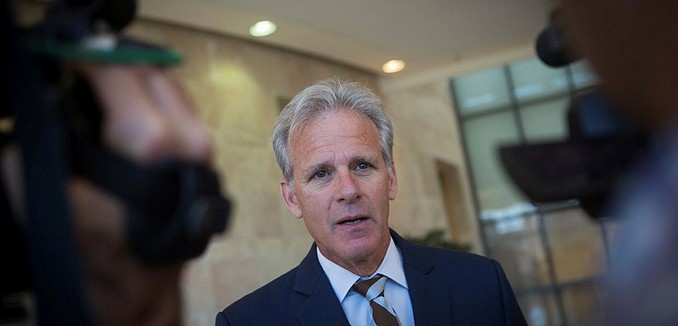Former Israeli ambassador to the United States and Knesset member Michael Oren (Kulanu) placed labels on European products at a supermarket in Jerusalem as a protest against the European Union’s initiative to mark Israeli goods from the West Bank, Golan Heights, and parts of Jerusalem, The Jerusalem Post reported Wednesday.
Kulanu MK Michael Oren went to a supermarket on Emek Refaim Street in the capital’s German Colony neighborhood and placed blue EU stickers on crackers, cookies and beer from Spain, France and Germany to protest the pending publication of guidelines to enable EU member states to place consumer labels on exports from east Jerusalem, the West Bank and the Golan Heights.
“The EU decision to label Israeli products is anti-Semitic,” Oren said. “There are dozens of border disputes and ‘occupations’ in the world but the EU decided to single out Israel. They are not labeling products from China, India or Turkey – only Israel.”
Oren complained that the decision completely ignored the fact that six Israeli prime ministers tried to negotiate a two-state solution but the PLO rejected their offers. He said the EU had not taken into account that the Palestinian Authority is refusing to negotiate with Israel and is actively inciting to commit terrorist attacks against Jews.
After pointing to the EU’s hypocrisy over the labeling of Israeli products, Oren raised practical questions about the guidelines, including the impact they would have on the livelihoods of hundreds of Palestinians who are employed by Israeli-owned factories in the West Bank. He also questioned the decision to label products from the Golan Heights at a time when there is no functioning central government in Syria, and asked whether Israel is expected to give the territory to the Islamic State of Iraq and Syria (ISIS).
Clifford May, the founder and president of the Foundation for Defense of Democracies, observed in a column last week that boycotting Israeli businesses in the West Bank causes hardship for their Palestinian employees and does nothing to foster coexistence.
Legal scholars Avi Bell and Eugene Kontrovich described the discriminatory nature of the EU’s labeling guidelines in a paper (.pdf) published this past August.
There are about 200 territorial sovereignty disputes worldwide, in many cases of which the EU does not accept sovereignty claims of the states which administer the territory in question. Among these territories are Western Sahara (controlled by Morocco), Kashmir (controlled in dif ferent parts by India, Pakistan and China), and many others. In many of these areas, the controlling state allows or actively encourages its citizens to live in the territory, in practices that are far more intrusive than those identified by Europe as “settlements” when Israel is involved. Despite the ubiquity of territorial disagreements and settlement practices, the EU has never unilaterally adopted a regulation requiring geographic labelling contrary to the exporting country’s certificate of origination.
In the specific case of Northern Cyprus, Kontorovich wrote that EU policy helps sustain Turkey’s occupation of the territory, which has been ongoing since 1974.
Turkey’s invasion and occupation of Cyprus in 1974 was condemned the UN Security Council, and the EU’s official policy is that the Turkish occupation is illegitimate, and Turkey must completely withdraw. The EU does not recognize the Turkish government in Northern Cyprus.
Nonetheless, the EU maintains an entire separate program to direct funds to Northern Cyprus. … The grants are pursuant to a 2006 regulation adopted by the EU to “end the isolation of the Turkish Cypriot community,” and allocated 259 million euros over five years, and now operates on an annual 28 million euro allocation (a sum that amounts to roughly 0.8 percent of Northern Cyprus’s GDP).
Earlier this week, Isaac Herzog, head of the Israeli opposition party Zionist Union, blasted the new labeling guidelines as “a prize that Europe is bestowing for terror.”
The EU has been discussing the labeling initiative since 2012 and is planning to issue its plan for implementing the scheme next week.
[Photo: Miriam Alster / FLASH90]




